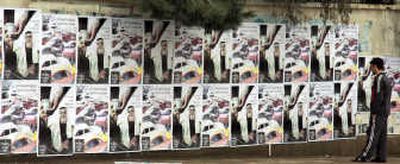With U.S. pushing, parliament narrowly OKs fall elections

BAGHDAD – Parliament cleared the way Wednesday for provincial elections this year that could give Sunnis a stronger voice and usher in vast changes to Iraq’s power structure.
The new law – which set the vote for Oct. 1 – is one of the most sweeping reforms pushed by the Bush administration and signals that Iraq’s politicians finally, if grudgingly, may be ready for small steps toward reconciliation.
Passage of benchmark reforms on healing the country’s sectarian and ethnic rifts – along with a reduction in violence – were the primary goals of the 30,000-strong U.S. troop increase that President Bush ordered early last year.
Violence has dropped significantly, but political progress languished until the logjam broke Wednesday by the narrowest of margins.
Before the vote, the only significant measure to emerge from parliament had been a law that allows reinstatement to government jobs of some low-level members of Saddam Hussein’s former Baath party.
The outcome of the October elections is likely to reshape Iraq’s political map.
Sunnis, who sat out 2005 elections, could claim a much stronger role in Iraqi political affairs. Already, Sunnis have provided critical help in security by joining the U.S.-led battles against al-Qaida in Iraq and other insurgents.
The Bush administration hailed the law’s passage.
“Many said that Iraq’s communities couldn’t relate to each other. Their grievances, their distrusts were so profound, they couldn’t reach fundamental compromises. Well, we’ve never believed that that was a correct assessment,” said David Satterfield, senior adviser to Secretary of State Condoleezza Rice.
Debate on the provincial election measure was raucous and ended in an 82-82 tie, broken by parliament Speaker Mahmoud al-Mashhadani, a Sunni.
On Tuesday night, he had threatened to disband the legislature and call early elections because lawmakers had been unable to compromise or even maintain a quorum.
The provincial elections and powers law was bundled together with the $48 billion 2008 budget and another measure that grants limited amnesty to prisoners being held in Iraqi custody.
Kurds, who operate from a semiautonomous region in the north of the country, insisted on the unusual legislative maneuver because they feared getting double-crossed on a deal that maintained their 17 percent share of the national budget.
Parliament immediately adjourned for a five-week break after the contentious measures were passed. They still must be approved by Iraq’s three-man presidency council.
But some important struggles remain for lawmakers. Still pending – and not likely to be resolved soon – is a measure that would divide Iraq’s oil wealth, one of the most vexing problems facing both parliament and the government.